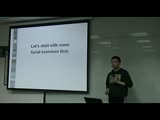This approach is also bipartisan. While many in my own party aren’t happy with the painful cuts it makes, enough will be willing to accept them if the burden is fairly shared. While Republicans might like to see deeper cuts and no revenue at all, there are many in the Senate who have said, “Yes, I’m willing to put politics aside and consider this approach because I care about solving the problem.” And to his credit, this is the kind of approach the Republican Speaker of the House, John Boehner, was working on with me over the last several weeks.
这种方式还是跨党派的。虽然我所在的党派的很多成员对痛苦的削减措施感到不满,但将有足够多的成员愿意接受削减措施,只要大家都公平地分担这一负担。尽管共和党人可能希望看到幅度更大的削减而不想增加任何税收,但参议院中也有很多人表示:“是的,我愿意将政治因素放在一边来考虑这个方式,因为我所关心的是解决这个问题。”值得肯定的是,共和党籍的众议院议长约翰·博纳几周来曾就这一方式与我共同努力。
The only reason this balanced approach isn’t on its way to becoming law right now is because a significant number of Republicans in Congress are insisting on a different approach -- a cuts-only approach -- an approach that doesn’t ask the wealthiest Americans or biggest corporations to contribute anything at all. And because nothing is asked of those at the top of the income scale, such an approach would close the deficit only with more severe cuts to programs we all care about -- cuts that place a greater burden on working families.
这种均衡的方式现在未能走上立法轨道的唯一原因在于国会中有相当一部分共和党议员坚持推行另外一种方式——一种只削减开支的方式——一种不要求最富裕的美国人或最大的公司企业做出任何贡献的方式。由于这种方式不要求那些收入最高的人做任何贡献,因而只能通过更严厉地削减我们都关心的项目来减少赤字——这类削减措施将加重工薪家庭的负担。
So the debate right now isn’t about whether we need to make tough choices. Democrats and Republicans agree on the amount of deficit reduction we need. The debate is about how it should be done. Most Americans, regardless of political party, don’t understand how we can ask a senior citizen to pay more for her Medicare before we ask a corporate jet owner or the oil companies to give up tax breaks that other companies don’t get. How can we ask a student to pay more for college before we ask hedge fund managers to stop paying taxes at a lower rate than their secretaries? How can we slash funding for education and clean energy before we ask people like me to give up tax breaks we don’t need and didn’t ask for?
因此,目前的辩论并非在于我们是否需要作出艰难的选择。民主党人和共和党人在我们需要减少赤字的数额方面有共识。辩论的焦点在于应如何达到这一目标。大多数美国人,不分党派,都不明白我们为什么要求老年公民为自己的老年医疗保险多付钱,却不要求为高层主管提供专用飞机的企业或石油公司放弃其他公司并不享有的税收优惠;我们为什么要求学生为他们的大学教育承担更高的费用,却不要求对冲基金经理不再按低于他们秘书的税率纳税;我们为什么要大幅削减用于教育和清洁能源的资金,却不要求像我这种收入的人放弃我们并不需要也没有提出要求的税收减免。
That’s not right. It’s not fair. We all want a government that lives within its means, but there are still things we need to pay for as a country -- things like new roads and bridges; weather satellites and food inspection; services to veterans and medical research.
这样做是不对的,也是不公平的。我们大家都要求我们的政府量入为出,但作为一个国家,仍然有一些必须支出的费用,如道路和桥梁之类的工程、气象卫星和食品检查、以及退伍军人的服务项目和医学研究。
And keep in mind that under a balanced approach, the 98 percent of Americans who make under $250,000 would see no tax increases at all. None. In fact, I want to extend the payroll tax cut for working families. What we’re talking about under a balanced approach is asking Americans whose incomes have gone up the most over the last decade -- millionaires and billionaires -– to share in the sacrifice everyone else has to make. And I think these patriotic Americans are willing to pitch in. In fact, over the last few decades, they’ve pitched in every time we passed a bipartisan deal to reduce the deficit. The first time a deal was passed, a predecessor of mine made the case for a balanced approach by saying this:
请记住,在一种均衡的方式下,年收入在25万美元以下的98%的美国人承担的税负不会增加。一点都不会。事实上,我想延长降低工薪家庭工资税的期限。我们所说的均衡方式是要求在过去十年中收入增加最多的美国人——百万富翁和亿万富翁——分担其他所有人都必须作出的牺牲。我认为这些爱国的美国人都愿意作出贡献。事实上,过去几十年来,每当两党一致通过减少赤字的协议时,他们都作出了贡献。在首次达成一项协议时,我的一位前任在为均衡的方式提出论据时曾这样说:
“Would you rather reduce deficits and interest rates by raising revenue from those who are not now paying their fair share, or would you rather accept larger budget deficits, higher interest rates, and higher unemployment? And I think I know your answer.”
“你们愿意让那些目前没有付出他们公平的一份的人缴纳更多的税款来增加国库收入从而降低赤字和利率,还是愿意接受更高的预算赤字、更高的利率和更高的失业率?我想你们都知道该怎么回答。”
Those words were spoken by Ronald Reagan. But today, many Republicans in the House refuse to consider this kind of balanced approach -- an approach that was pursued not only by President Reagan, but by the first President Bush, by President Clinton, by myself, and by many Democrats and Republicans in the United States Senate. So we’re left with a stalemate.
这些话是罗纳德?里根说的。但今天,众议院很多共和党议员都拒绝考虑这种均衡的方式——尽管不仅里根总统遵循了这种方式,第一位布什总统、克林顿总统、我本人以及美国参议院很多民主党和共和党议员都遵循了这种方式。为此,我们现在处于一种僵持的局面。
Now, what makes today’s stalemate so dangerous is that it has been tied to something known as the debt ceiling -- a term that most people outside of Washington have probably never heard of before.
今天,这种僵局之所以如此危险,是因为它与被称作国债上限的东西挂了钩,政府以外的大多数人过去也许从未听说过这一术语。











